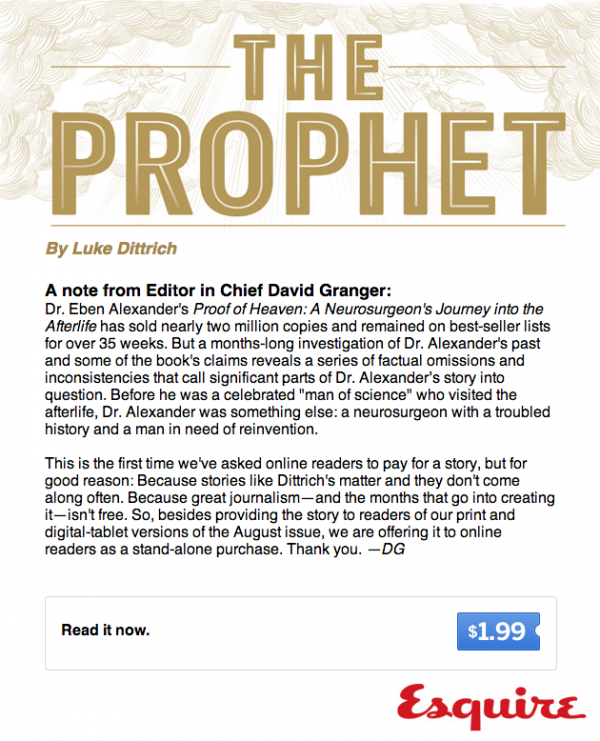 I’ve been a subscriber to Esquire for many years. I really enjoy the quality of the writing, though I took the magazine to task for a poor QR code experience back in 2010.
I’ve been a subscriber to Esquire for many years. I really enjoy the quality of the writing, though I took the magazine to task for a poor QR code experience back in 2010.
Clearly Hearst, parent company to Esquire, is continuing to experiment with ways to monetize content online. Last week MediaBistro and John Battelle ran stories about Esquire asking non-subscribers to spend $1.99 to access The Prophet, a 10,000 word investigative report on Dr. Eben Alexander, a former nuerosurgeon who wrote the book Proof of Heaven about visiting heaven during a near-death experience.
I really like this experiment. I’m biased, since I’m a subscriber and know the story to be a high quality piece of work. But this is exactly the kind of creativity that traditional media needs to exhibit to find a direct funding mechanism to support this type of long form journalism.
Battelle’s story is especially good because he adds a social element with a sliding fee based on popularity. Making a few assumptions about costs and overhead, he estimates Esquire only needs to produce $10,ooo to make this experiment a financial success. That’s 5,000 people paying $1.99 each.
But then he adds the social piece. What if there was a sliding cost, and after 5,000 people sign up the price goes down? That way, early buyers would have incentive to spread the word to others via social sharing tools, and the total number of new contacts exposed to Esquire content (and advertising) could rise faster. If enough people signed up, maybe the cost goes down to 50 cents.
To all that, I’d suggest Esquire adding elements of online gaming. Come up with different levels of badging and status for those who most effectively promote paid content online. Find ways to reward them with swag like tee shirts and gift certificates. Not only could the magazine support high quality reporting, they could cultivate brand evangelists.
A lot of the tools required for this approach already exist, with the exception of some kind of broadly available way to make micropayments. No one has yet figured out how to make those convenient and economically viable, but hopefully someday someone will.
In the meantime, this kind of creativity is just what the publishing world needs. Maybe a social paywall changes the equation. I hope Esquire explores some of these ideas.
If you’re not an Esquire subscriber, take it from me — the story is worth it. Kick them $2 and let me know what you think.